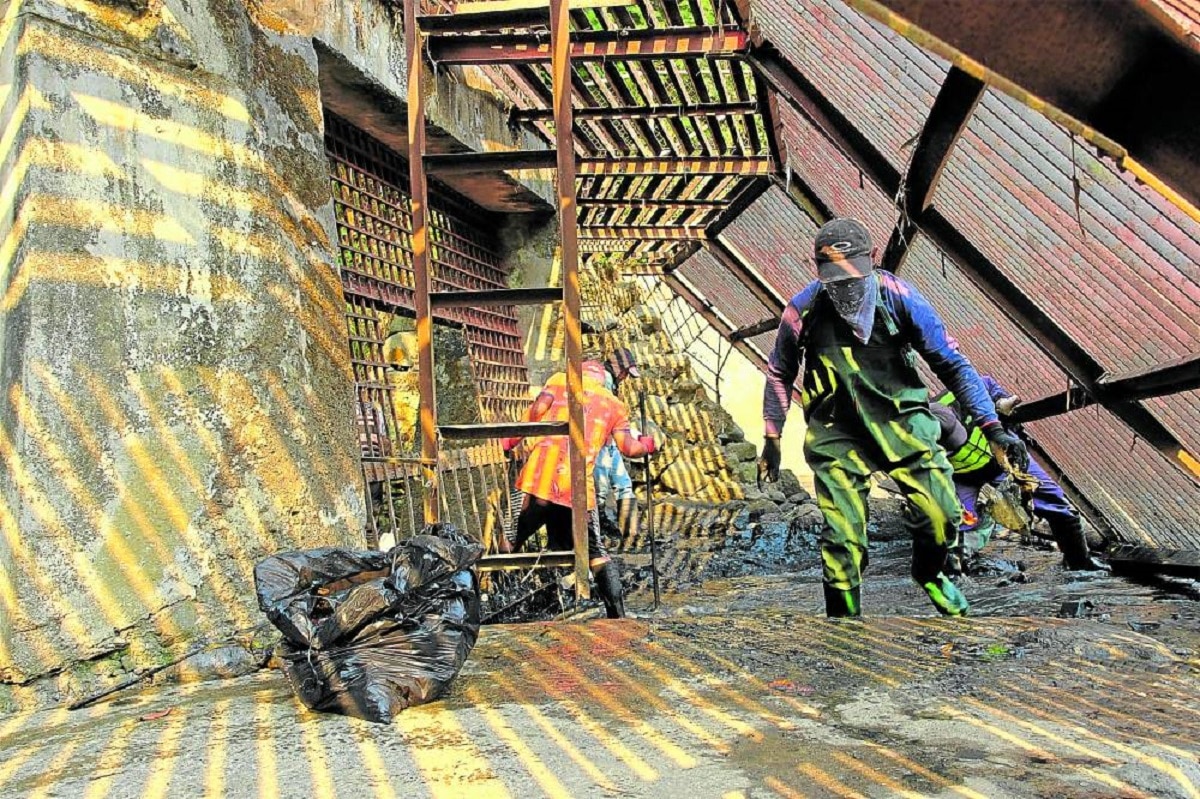
DRAIN PATROL Baguio government workers, including volunteer firemen, policemen and villagers, clear the city’s tunnels and waterways, like the drains of City Camp Lagoon, of trash and debris to prepare for the rainy season. The volume of garbage generated in the summer capital has been increasing as the population grows and businesses expand. —Neil Clark Ongchangco
BAGUIO CITY, Philippines — A P20-million standby fund for hauling Baguio trash has been added to a supplementary annual investment plan in the event the commercial landfill operating in Capas, Tarlac, is shut down by the state-run Clark Development Corp. (CDC) by October, when its lease expires.
The amount takes into account a much higher trucking cost and tipping fee should Baguio start shipping its residual waste to a Pampanga facility, which is 30 kilometers farther from the Capas-based Metro Clark Waste Management Corp., according to Eugene Buyucan, head of the City General Services Office, during the Monday session of the city council.
According to City Administrator Bonifacio dela Peña, the P20-million fund is a proactive measure, and while Baguio has explored other facilities to dump its trash, the city government has not entered into any deals in the meantime.
READ: Baguio eyes trash cut as landfill closure looms
For over a decade, Baguio has been spending as much as P200 million annually to bring its trash to Metro Clark’s Kalangitan landfill.
Back in March, CDC, a subsidiary of the Bases Conversion and Development Authority, announced it was no longer renewing Metro Clark’s contract to operate its 100-hectare sanitary landfill after October because of a government policy shift regarding the area’s prospective land use.
READ: Waste-to-energy projects in Baguio to be scrapped
Asserting that it was entitled to a 50-year operation, Metro Clark petitioned an Angeles City court in June for a “reformation of instruments.”
The petition asked the court to redraw the agreement to express the actual and original intent of the deal. According to Metro Clark, what will expire in October is its service contract, not the lease itself.
Last month, Buyucan laid the groundwork for enhancing the city’s materials recovery facilities (MRFs), where trash is further sorted into recyclable, biological, and residual waste to reduce the volume of garbage sent out to landfills.
Households and businesses in Baguio, which has a population of nearly 400,000 that excludes tourists, generate an average of 500 metric tons of trash daily.
Not closing doors
Dela Peña said the Baguio government has not closed its doors to other technologies to address the city’s growing waste.
An environmental group has been gathering data in BLISTT, the metropolis composed of Baguio and the neighboring Benguet towns of La Trinidad, Itogon, Sablan, Tuba and Tublay, after Baguio was nominated for the Asean-Republic of Korea Cooperation Fund, which is financing the program “Integrated Municipal Solid Waste Management for Environmentally Sustainable Cities.”
The project designs appropriate waste management systems that are efficient and environmentally safe and would direct investments to local communities to reduce their carbon footprint.

